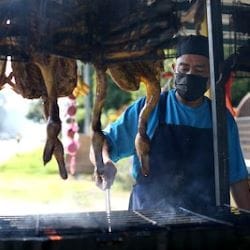
 An international team, including Society Fellow Professor Eddie Holmes FRS FRSN FAA of the University of Sydney, has determined that the earliest cases of COVID-19 arose in a wholesale fish market in Wuhan, China in December 2019. Their results linked these cases to bats, foxes, and other live mammals infected with the virus being sold in the market either for consumption as meat or for their fur.
An international team, including Society Fellow Professor Eddie Holmes FRS FRSN FAA of the University of Sydney, has determined that the earliest cases of COVID-19 arose in a wholesale fish market in Wuhan, China in December 2019. Their results linked these cases to bats, foxes, and other live mammals infected with the virus being sold in the market either for consumption as meat or for their fur.
The findings, published in the 26 July 2022 issue of Science, align with early reports, later dismissed by senior Chinese officials, that live animals sold at the Huanan Seafood Wholesale Market were the likely source of the pandemic that has claimed at least 6.4 million lives since it first emerged in China nearly three years ago.
Amongst the key findings of this study are:
- The emergence of SARS-CoV-2, the virus that causes COVID-19, can likely be traced to one or more of the 10 to 15 stalls in the market that sold live dogs, rats, porcupines, badgers, hares, foxes, hedgehogs, marmots and Chinese muntjac (a small deer). Health officials and researchers detected SARS-CoV-2 on animal cages, carts and drainage grates in these venues
- The only areas where the virus was spreading in December 2019 were in neighborhoods within a half-mile of the market. Previously, some researchers had suggested that the virus was brought into the market from elsewhere in the city and spread among its patrons. Instead, the new findings strongly suggest that the virus originated in the market via live animal sales, and slowly spread from there into nearby neighborhoods and then the city at large
- Two variants of the SARS-CoV-2 virus were detected at the market. That suggests both variants originated independently at the market and helps confirm the researchers’ hypothesis that the early spread of the infection began there. If the virus originated elsewhere, it’s more likely that only a single variant would have been found.
The researchers observed that, for the future, public officials should seek a better understanding of the wildlife trade, in China and elsewhere, and promote more comprehensive testing of live animals sold in markets to lower the risk of future pandemics.
The content of this post was sourced from a University of Utah press release.